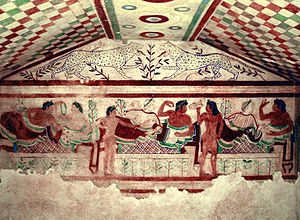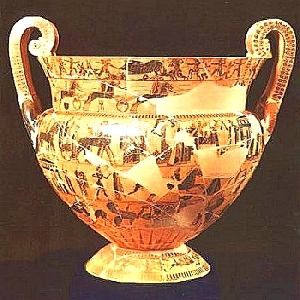Learning in the Etruscan world centered around religion, but the Etruscan religion encompassed many different aspects of life--not just questions like What happens when I die? and How do I live a good life? but ones like How do I raise my animals? and What does this art mean? as well.
So little text survives from the Etruscans that it is very difficult to tell how exactly or what exactly they learned and studied, but we do know that they had institutes of learning, sort of like universities. One of these (the largest, it would seem from the remains) was at Tarquinii.
 | |
| Some tomb art found at Tarquinii |
Within these institutes, it is likely that students and teachers both relied heavily upon oral education as a means of transmitting ideas--something I discuss at some length in this post. However, the lack or Etruscan texts remaining today does not mean that they did not use books then--some historians theorize that a substantial body of literature once existed, but was destroyed, either through human error or by natural causes.
The more I learn about the Etruscans, the more I am finding that they have an interesting and unique position on the family tree of European civilizations. Their writing system was highly correlated with that of the Greeks, but their language itself wasn't. Their knowledge institutions seem to have had some similarities with their European neighbors and predecessors and other similarities to their Mediterranean neighbors, but so little remains that it is hard for us to tell much about them. The fact that almost nothing remains of them, in an area in which we find such detailed remains of other, nearly-contemporary cultures is yet another enigmatic facet of Etruscology.

It is interesting the way you were talking about the distinction between seminaries and universities. As we discussed in several of our posts during the oral unit, most information and institutions of learning were based in religion. there wasn't much of a delineation between secular and spiritual back then. The original medical schools were also seated in monasteries along with the ecumenical education. So is there really that much of a distinction between universities and seminaries.
ReplyDeleteThe word "seminary" is actually a rather cool word, it etymology and stuff. There is really only a distinction between seminaries and universities nowadays in our usage of the word, but there wasn't originally. The word's Latin roots mean a 'plant nursery', where "semin" or "semen" means 'seed'. But I would say, No, Alicia, there really isn't a difference, except in the focus of study. Seminaries now are religious universities, where the education is completely focused on learning to be a priest, rabbi, or minister of a particular faith. In a way, BYU could be called a seminary, since it is a church-operated school with tithing money and everything, and all members are expected to serve in the Church in some capacity. We believe in Lay Clergy, that volunteer their time, and we believe in educated people, and this University prepares us to be both.
ReplyDeleteFirst of all I find it so interesting that we go to BYU in a country where separation of church and state are so important. I always wondered how that was going to work out and I am still learning how that interplay works.
ReplyDeleteI also find it interesting how some cultures we know so much about (Greeks, Romans and Egyptians and some we don't (Etruscans). I wonder why that is? Perhaps it has to do with what countries were the most powerful? I hesitate to put the blame solely on that though.
Will, I would say the ones that contributed directly to our culture or language. At least this is why we learn about European and American history and not Tibetan history. So maybe the information and artifacts about other cultures was just neglected and lost
ReplyDeleteWow. The things you learn by studying etymology. Found out where the word avocado comes from the other day too. So random. Anyway, I think it is interesting too that we selectively learn about different cultures. I know it is probably an overstudied topic, but really history is in the eye of the beholder. It's written by the winners, the men, the superpowers. And sometimes people even burned the histories of those considered heathens - i.e. the spaniards to the aztecs.
ReplyDeleteI think what we study at universities now is based upon perspective. Like you guys mentioned, we focus more on European and American history here in America, because those histories influenced our country today. But I'm sure in countries such as China they learn about ancient Chinese culture and not so much European or American history.
ReplyDelete